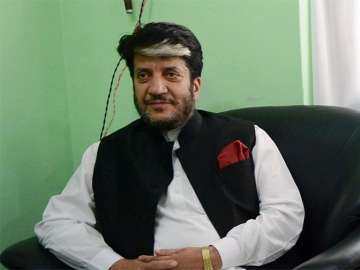Kashmiri separatist Shabir Shah moves court for bail, wife alleges slow poisoning
Additional Sessions Judge Sidharth Sharma, who had in August last year denied the relief to Shah citing ongoing probe, directed Enforcement Directorate’s (Ed) special public prosecutor N K Matta to file a reply to the fresh bail plea by February 26.

A Delhi court today directed the Enforcement Directorate (ED) to file its reply to a fresh bail plea of Kashmiri separatist leader Shabir Shah in a 2007 money laundering case related to alleged terror financing, even as his wife claimed he was being “slow poisoned” in the prison.
Additional Sessions Judge Sidharth Sharma, who had in August last year denied the relief to Shah citing ongoing probe, directed Enforcement Directorate’s (Ed) special public prosecutor N K Matta to file a reply to the fresh bail plea by February 26.
In his bail application, the accused told the court that investigation in the case has been completed since the agency has filed its charge sheet and there was no chance for Shah to hamper the probe.
Advocate M S Khan, appearing for Shah, told the court that no purpose will be served by keeping him in custody. Shah, who appeared before the court through video conference, also said he was lacking treatment inside the jail.
“Trial is only going on because I am alive. If there is no Shah, there will be no trial,” 62-year old Shah said. Meanwhile, Shah’s wife Bilquies Shah, also moved an application before the court through the defence lawyer and claimed that her husband was suffering from various ailments and was on regular medicine for last six years. She alleged that Shah was facing difficulty in getting those medicines inside the jail and was now also suffering from sudden loss of consciousness.
“My husband had similar fainting attacks in Tihar Jail. Repeated requests were made to the jail authorities but no steps were taken in this regard. This is a clear indication of slow poisoning of my husband by the jail authorities,” she told the court in her application.
The court, meanwhile, initiated the trial and started recording the statement of the prosecuton witnesses. It posted the matter for further hearing on February 26. The court had on August 22 last year rejected Shah’s bail plea after the ED said it was probing whether he had received money from countries such as Pakistan to promote terrorism in India.
On November 15, the court had framed money laundering charges against Shah and alleged hawala dealer Mohammad Aslam Wani in the case. Both the accused pleaded not guilty and claimed trial.
The ED had on September 23 filed the charge sheet against Shah, accusing him being in touch with Pakistan-based terrorist Hafiz Saeed. It had also named Wani, who is in judicial custody along with Shah.
The court had taken cognisance of the over 700-page charge sheet which relied upon 19 witnesses. The central probe agency, in the charge sheet filed under sections of the Prevention of Money Laundering Act (PMLA), had furnished Shah’s statements where he had allegedly told the investigators that he has “no source of income of his own” and that he does “not file any Income Tax Return (ITR).”
The probe agency had recorded the statement of 36-year old Wani where he allegedly said that he came to Delhi from Srinagar “at the directions of Shah” sometime in April, 2003 and that was the first time he had met him. Wani was arrested by the ED on August 6 from Srinagar.
The ED alleged that Wani was asked by Shah to “work for him (on a commission basis) in collecting hawala money from Delhi and deliver to him at Srinagar.” The case dates back to August 2005 in which the Delhi Police’s Special Cell had earlier arrested Wani.
Wani had then claimed that he had given Rs 2.25 crore to Shah, following which the ED had registered a case under PMLA against the duo in 2007. He was arrested with Rs 63 lakh, allegedly received through ‘hawala’ channels from the Middle East, and a cache of ammunition, on August 26, 2005.
In 2010, a Delhi court had cleared Wani of terror funding charges in 2005 case but had convicted him under the Arms Act.